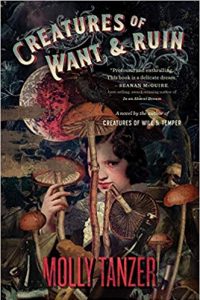Liz Bourke Reviews Creatures of Want and Ruin by Molly Tanzer
 Creatures of Want and Ruin, Molly Tanzer (John Joseph Adams/Houghton Mifflin Harcourt 9781328710253, $16.99, 352pp, tp). November 2018. Cover by Eduardo Recife.
Creatures of Want and Ruin, Molly Tanzer (John Joseph Adams/Houghton Mifflin Harcourt 9781328710253, $16.99, 352pp, tp). November 2018. Cover by Eduardo Recife.
Molly Tanzer has a track record of writing weird and marvelous novels that sit uneasily on the border between dark fantasy and horror. Creatures of Want and Ruin is her latest, set in the same continuity as Creatures of Will and Temper, but where Creatures of Will and Temper set its action in 19th-century London, Creatures of Want and Ruin removes to Prohibition New York, setting itself in small-town Long Island among poets and bootleggers.
Ellie West works on the bay near the town of Amityville, fishing by day and selling bootleg moonshine by night. Her younger brother Lester was accepted to university, and she’s determined to see him go – determined enough to work at night during a bad blow, on her way back from her lover (poet Rocky) to her fiancé (carpenter Gabriel, who’s on board with the whole Rocky thing). On the bay, she runs into a fellow bootlegger in distress – but he tries to kill her, and Ellie ends up killing him in self-defence. She takes his bootleg moonshine, too, and tries to convince herself that the weirdness she saw during the struggle was only an artefact of hypoxia, adrenaline, and pain, not anything actually supernatural.
Fin Coulthead has come to Amityville because her (neglectful) society husband and his collection of bright young things decided to spend the summer there. Fin is increasingly isolated in their company, and spends most of her time practising her archery and travelling around Long Island, trying to convince herself she’s not being ignored and isolated. She loves Long Island: it’s the only consolation to her current situation.
When Ellie’s asked to provide moonshine for a party at the Coulthead house, she doesn’t quite have enough from her regular stock, so she makes the choice to sell the Coultheads the stock she acquired the night she nearly died. After all, as far as she can tell, there’s nothing wrong with it – it tastes a bit musty, but that’s about it.
This booze is no ordinary moonshine. Distilled from disgusting mushrooms by a cult of diabolists, people who drink it see terrible visions of the utter destruction of Long Island in fire and decay. This diabolist cult is masquerading as a church – adherents of the church believe the visions of destruction are a metaphor – which is preaching salvation through temperance and a return to the good old days of yore: a message of racism and misogyny and xenophobia to go along with their unwitting eagerness for a destruction that (little though they know it) won’t exempt them.
Ellie’s father has joined this church of racism and patriarchy. Members corner Ellie and her fiancé, Gabriel, whose parents emigrated from Poland, and do worse than threaten violence. Everything Ellie loves is under threat, but though she feels that danger is coming, that something supernatural is at work, she has nothing concrete she can point to. When tragedy hits closer to home, she doesn’t want to believe her father’s responsible.
The night of the Coulthead party, Fin sees a vision of destruction. She’s convinced of its reality, but neither her husband nor his collection of bright young things are any support to her. (Fin is beginning to feel as though her marriage has ended and no one but her has noticed, or cares.) When she goes looking for allies – really anyone, to believe her and to help her figure out what’s going on – she lands on Ellie’s doorstep. Together, Fin, Ellie, Gabriel, a local police officer, and Ellie’s bootlegger friends figure out the truth about the visions – and about demons. And Fin makes a perilous, terrible bargain with a demon, in the hopes of being able to prevent Long Island’s destruction, a bargain that will ultimately cost her everything.
This is a quiet, atmospheric book. It’s deeply rooted in place, in the rhythms of work on the water, and rooted in time, too, situating itself in the years of Prohibition. (Ellie’s father received a disabling wound in military training before ever going to war; that’s the only real mention that WWI gets in these pages.) But it also feels troublingly contemporary, in the willingness of a community to turn its quiet racism into loud and violent racist action at the prompting of a selfish and self-righteous demagogue, and in Ellie’s struggle to come to terms with her father’s sudden turn towards viciousness in opposition to her life and her choice of fiancé. In Fin’s isolation within her marriage, her situation of constantly being rendered invisible, we also find strong contemporary resonances – who’s willing to hear a woman tell her truth and stand up for herself, after all?
Tanzer has a deft hand with characterisation. Both Ellie and Fin, the viewpoint characters in Creatures of Want and Ruin, come alive in their different fashions: Ellie with blunt practicality (tempered with a bent towards the poetic); Fin in her desire to change the world, which is slowly being squashed in lonely emotional isolation within her marriage. The secondary characters are less vivid, but still strongly drawn.
Creatures of Want and Ruin treads a measured pace towards its conclusion, but every page is compelling. This is quiet horror, filled with emotional realism: a growing sense of unease suffuses every encounter with the demonic, until the true horror is revealed – and that horror is about equally divided demonic and human.
This is a satisfying book, and a very readable one. I enjoyed it greatly and hope to see many more novels from Molly Tanzer in the years to come.
Liz Bourke is a cranky queer person who reads books. She holds a Ph.D in Classics from Trinity College, Dublin. Her first book, Sleeping With Monsters, a collection of reviews and criticism, is out now from Aqueduct Press. Find her at her blog, her Patreon, or Twitter. She supports the work of the Irish Refugee Council and the Abortion Rights Campaign.
This review and more like it in the December 2018 issue of Locus.
 While you are here, please take a moment to support Locus with a one-time or recurring donation. We rely on reader donations to keep the magazine and site going, and would like to keep the site paywall free, but WE NEED YOUR FINANCIAL SUPPORT to continue quality coverage of the science fiction and fantasy field.
While you are here, please take a moment to support Locus with a one-time or recurring donation. We rely on reader donations to keep the magazine and site going, and would like to keep the site paywall free, but WE NEED YOUR FINANCIAL SUPPORT to continue quality coverage of the science fiction and fantasy field.







